
20-02-2026 18:47
 Marc Detollenaere
Marc Detollenaere
Hello Forum,On rotten wood of Fagus, I found some

07-02-2023 22:28
Ethan CrensonHello friends, On Sunday, in the southern part of

19-02-2026 17:49
Salvador Emilio JoseHola buenas tardes!! Necesito ayuda para la ident

19-02-2026 13:50
Margot en Geert VullingsWe found this collection on deciduous wood on 7-2-

16-02-2026 21:25
 Andreas Millinger
Andreas Millinger
Good evening,failed to find an idea for this fungu

08-12-2025 17:37
 Lothar Krieglsteiner
Lothar Krieglsteiner
20.6.25, on branch of Abies infected and thickened

17-02-2026 17:26
 Nicolas Suberbielle
Nicolas Suberbielle
Bonjour à tous, Je recherche cette publication :
These perithecia grow on a well developped reddish stromata erumpent from bark of Populus nigra. KOH = purplish. The asci have an conspicuous apical apparatus. Macroconidia are hyaline and 3-7 septate. Maybe Neonectria coccinea?
Many thanks again
Enrique

Your sample is really very similar to Neonecria coccinea sensu lato. But Neonectria is very difficult genus, for which annually described lots of new species. Identification without culture and molecular analysis is not very rewarding job. Name Neonectria coccinea sensu strictu now used only for the samples which are collected from Fagus. For Neonectria coccinea-complex representatives from other substrates it is better to use the name Neonectria caespitosa (Fuckel) Wollenw.
In ARS database stated:
According to Castlebury et al. (in press), Neonectria coccinea sensu stricto is restricted to Fagus spp. in Europe. Records from Fagus in North America are referred to Nectria coccinea var. faginata, soon to be transferred to species rank in the genus Neonectria (Castlebury et al. in press).
Distribution: Reported from Europe, North America, New Zealand, Africa (Malawi). According to Castlebury et al. (in press), Neonectria coccinea sensu stricto is restricted to Fagus spp. in Europe. Records from Fagus in North America are referred to Nectria
Substrate: Hardwood trees, dung, soil.
Disease Note: No clear evidence of pathogenicity (Booth 1966).
Host: Trees of multiple plant families.
Alex

I made a similar find last week on Populus tremula, but with larger ascospores 16-17 x 5µm. Neonectria coccinea is supposed to be host-specific for Fagus, thus all similar species on other hosts must be re-evaluated. Amy Rossman is working on this topic, you should send her this collection.
Everyday at the post office!
Cheers,
Jacques

In the attached file I send you "classical" description on Neonectria coccinea sensu lato and related anamorph from C. Booth article: The genus Cylindrocarpon // Mycological Papers, 1966, N104.
As you can see its really corresponds with your:-)
Alex

E-mails of Neonectria specialists from USA:
Amy Rossman <amy@nt.ars-grin.gov>
Lisa Castelbury <castlebury@nt.ars-grin.gov>

to my knowledge species of Neonectria are not fungicolous but are seated on a more or less well-developed stroma erumpent from the bark.
Are you sure the macroconidia you observed were of the Cylindrocarpon type? Many fungicolous species belonging to Cosmospora s.l. have Fusarium-like anamorphs with macroconidia resembling those of Cylindrocarpon but somewhat hooked at one or both ends.
Jacques
Enrique
Dear Enrique,
This appears to be Neonectria coccinea in the broad sense. True N.
coccinea only occurs on beech as shown in the attached paper. We have a
student and Japanese scientist who are working on defining the non-Fagus
species of N. coccinea. Hopefully they will be able to distinguish them
morphologically but that is not always true. It may be necessary to grow
the Cylindrocarpon asexual state in order to identify it and even then....As you
can see they all look similar in the sexual state.
We would welcome your specimen as part of this study if you care to send
it here to the address listed below. Also, you can see this paper that I
saw just today on this group of fungi.
All the best!
Amy

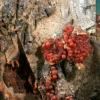
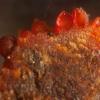
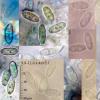
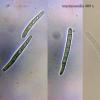
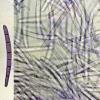
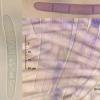
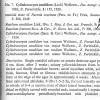
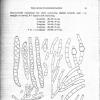
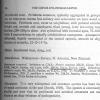
 Neonectria-on-Fagus-0001.pdf
Neonectria-on-Fagus-0001.pdf